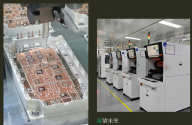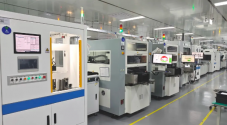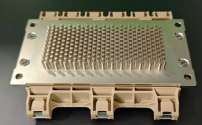What impress me is the target capacity of
50K 12" wafers per month. Of course this is target capacity, i.e. it will be reached in the next 1/2 years, currently they are still setting up the line.
What it means 50K wpm?
- The die size of HBM is generally
than DDR5 of the same process and capacity
- SK Hynix DDR5 is
(2GB), the others manufacturers have better densities, this is worst case.
- So for HBM memory we can assume a die of 75,21x1,45 = 109mm2 for 2GB
- Assuming an almost square die of 10.4X10.3
around 540 dies per wafer, i.e. 1080GB per wafer
- The key parameter is the yield. We don't know it. SK Hynix achieved
, here we can assume a much more conservative
60% yield. With this we have 1080*0.6 =
650GB per wafer
- Ascend 910 seems
of memory,
- So assuming 64GB per AI GPU we have that
each memory wafer is enough for 10 Ascend AI GPU.
- Finally, target capacity of
50Kwpm of HBM memory is enough for
6 million Ascend 910B AI chips per year!
My final comment is that with 50K wpm of HBM memory China will be well above self-sufficiency.
Report that Chinese firms stockpile HBM from Samsung
Given the above, they need to stockpile for at least 12 months, possibly 24 months production. After that CXMT will provide the needed memory.
American sanctions and export controls are backfiring:
everybody, friend and foe, wants to
de-Americanize its products,
to be not a victim of American sanctions and export controls on products containing any American technology.
See also:
The Foreign Direct Product Rule or other technical thresholds are just a thin layer of legalese veneer that covers the real elephant in the room: US can enforce these unilateral, long arm jurisdiction rules only because on the other side there are "allied" nations. Instead, for nations with full sovereignty all these unilateral, not negotiated, whimsical rules are just garbage.
For instance US cannot prevent Chinese firms to sell to other Chinese firms, no matter what's in the product, simply because the Chinese government does not bow to US pressure. Not only that, if US goes directly against a local company, the Chinese government will do all it can to support the company under attack. Huawei is a clear poster-child here. Huawei maybe would have not survived without huge government behind-the-scene support: national contracts, assured support by local suppliers, etc..
A counterexample is Japan, that decided to stop export of advanced equipment although it is already 100% de-americanized, just because Japan government was asked to do so.





